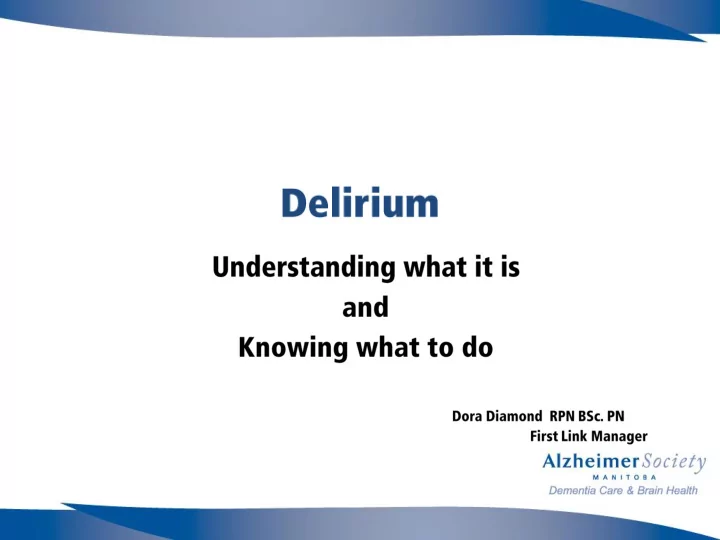

Delirium Delirium is characterized by an acute onset (hours or days) and fluctuating course of deterioration in mental functioning. DELIRIUM IS A MEDICAL EMERGENCY!
Delirium: Hallmark Features • Inattention- inability to sustain focus • Perseveration- unable to appropriately shift attention
Terms and Definitions • Delusion - A false belief. • Hallucination - Seeing or hearing what is not in the environment. • Illusion- When an object seems to appear to be something different than what it is.
Delirium: Types • Hyperactive delirium - very active, repetitive behaviors, wandering, hallucinations and may have verbal or physical outbursts. • Hypoactive delirium- characterised by reduced arousal, lethargy and drowsiness. • Mixed delirium- a fluctuation between hyperactive delirium and hypoactive delirium.
Case Scenario • Joe is 80, he has dementia and lives at home with his wife Margaret • Margaret is trying to give Joe his medication and says “ Joe, it is time to take your meds” • Joe is looks very drowsy, is not making eye contact • He looks sad and distracted and does not answer
Delirium: Risk Factors • A person over the age of 65 • Mild Cognitive Impairment, Dementia • Prior delirium • History of falls
Delirium: Risk Factors • Recent surgery • Change of an already present chronic illness • Dehydration • Malnourishment
Delirium: Risk Factors • Sleep deprivation • Withdrawal of drugs or alcohol
Prevention Strategies • Gain knowledge about delirium • Use caution with medications • Manage chronic pain • Treat infections early
Delirium: Causes • Infection ( bladder or pneumonia) • Medication side effects • Improper administration of medications
Delirium: Causes • Alcohol or medication withdrawal • Falls • Hospitalization
Delirium: Signs and Symptoms • Inattention • Disturbance of memory • Disorientation and disorganized thinking • Disturbance to sleep-wake cycle
Delirium: Signs and Symptoms • Restless or very sleepy • Altered perceptions (delusions, hallucinations, illusions) • Emotional disturbance ( physical or verbally reactive)
Delirium versus Dementia • Delirium is a sudden onset of mental confusion as a result of a underlying medical condition (Reversible) • Dementia is a progressive change in cognitive functioning as a result of progressive degeneration of brain cells (Non-Reversible)
Delirium versus Dementia Onset Duration Attention Psychomotor Mood Psychotic span activity features Sudden Usually Increased Normal Hallucinations Delirium (days or short, days Decreased or decreased to Visual hours) to weeks anxious Tactile Paranoid Normal Usually Usually delusions Months to can Dementia slowly Normal normal or Hallucination years have over years decreased (visual, not apathy often)
Caregiver Approach • Provide a calm reassurance to the person • Ensure the person’s pain is managed • Provide a calm, quiet environment • Orientate the person as often as possible
How families can help: Care Strategies • Healthy rest and sleep: Reduce noise and distractions Adjust lighting Increase comfort
How families can help: Care Strategies • Physical Activity Help the person with walking and sitting Discuss with your health professional safe physical activities
How families can help: Care Strategies • Hydration and healthy eating Help with eating Offer fluids often
How families can help: Care Strategies • Healthy Hearing: Ensure person has their hearing aides and that they are working properly
How families can help: Care Strategies • Healthy Vision: If the person has glasses, ensure they are wearing them and that they are clean Provide good lighting Have a magnifying glass present
How families can help: Care Strategies • Mental stimulation: • Socialization • Current events and surroundings • Reading- use larger print
Delirium: Treatment • Your Health Professional will: Find and treat the underlying cause of the delirium Do a medication review Give fluid by intravenous Give medications that calm the person with delirium
Questions ?
Delirium: Fast Facts • It is a Medical Emergency! • Sudden onset • Inattention: Inability to maintain focus • Perseveration: Unable to shift focus
Dora Diamond First Link Manager Alzheimer Society of Manitoba Phone: 204-943-6622 Email: ddiamond@alzheimer.mb.ca
Recommend
More recommend